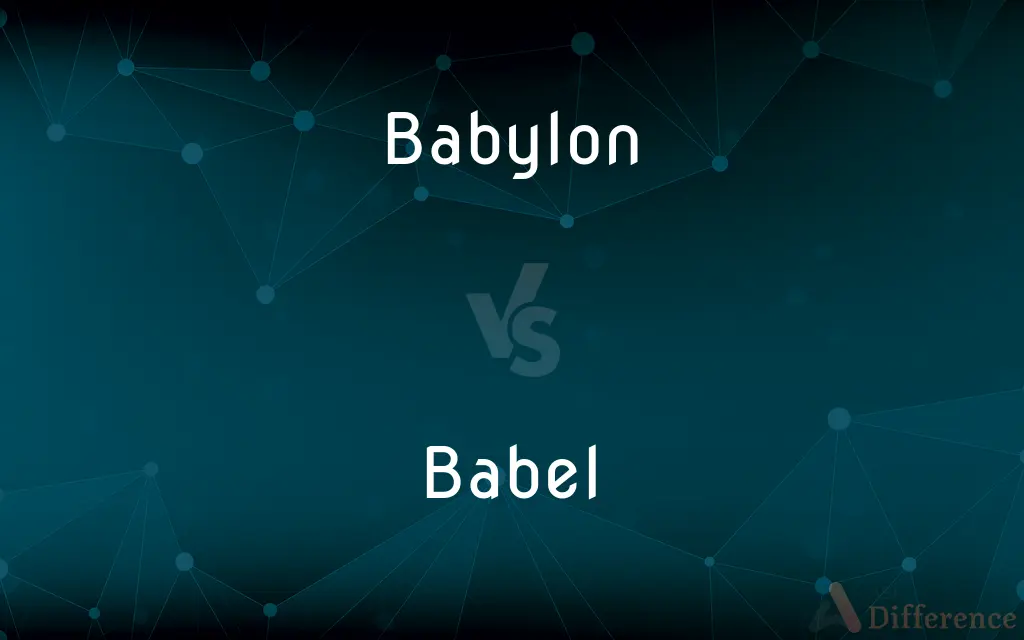Babylon vs. Babel — What's the Difference?
By Urooj Arif & Fiza Rafique — Updated on April 5, 2024
Babylon was an ancient city-state, while Babel is often associated with the Biblical Tower of Babel story, symbolizing human hubris and the origin of diverse languages.

Difference Between Babylon and Babel
Table of Contents
ADVERTISEMENT
Key Differences
Babylon, located on the Euphrates River, was a major city of ancient Mesopotamia, famous for its architectural and cultural achievements, including the Hanging Gardens, one of the Seven Wonders of the Ancient World. Babel, on the other hand, is known primarily from the Biblical narrative in Genesis, describing a tower that humanity built to reach the heavens, leading to the confusion of their language by God as a punishment for their arrogance.
While Babylon's contributions to civilization include advances in law, science, and architecture, symbolized by the Code of Hammurabi and its monumental city walls and buildings, Babel represents a cautionary tale against overreaching ambition and the loss of unity through the scattering of peoples and languages. Babylon was a real historical entity, serving as the capital of several ancient empires, whereas Babel's existence outside the Biblical narrative is subject to interpretation, often seen as symbolic or allegorical.
Babylon was a center of learning and culture, attracting scholars, artisans, and builders, which facilitated the spread of its influence across the ancient Near East. Babel's story emphasizes the limits of human achievement and the consequences of attempting to surpass divine boundaries, serving as a lesson on the dangers of pride and the value of diversity in human language and culture.
The fall of Babylon to the Persians in 539 BC marked the end of its dominance, but it left a lasting legacy on subsequent cultures and empires. The story of Babel has influenced theological, philosophical, and linguistic thought, presenting a foundational myth on the origins of cultural diversity and the human propensity for ambition and unity.
Babylon's archaeological sites provide tangible evidence of its existence and grandeur, with excavations revealing the city's layout, public buildings, and artifacts. In contrast, the Tower of Babel's location and historical authenticity are debated, with interpretations often relying on religious or mythological contexts rather than archaeological evidence.
ADVERTISEMENT
Comparison Chart
Nature
Ancient city-state with historical and archaeological evidence.
Mythological tower symbolizing human ambition and diversity.
Key Symbol
Architectural and cultural achievements, including the Hanging Gardens.
The confusion of languages as divine punishment.
Historical Role
Capital of empires, center of learning and culture.
Symbolic tale of human unity and divine intervention.
Legacy
Contributions to law, science, architecture; influenced subsequent cultures.
Influenced theological, philosophical, linguistic thought.
Existence
Historical, with extensive archaeological evidence.
Primarily biblical and allegorical, with debated historicity.
Compare with Definitions
Babylon
Ancient metropolis.
Babylon was renowned for its majestic Ishtar Gate and lush Hanging Gardens.
Babel
Divine punishment.
The Tower of Babel's construction led to the confusion of languages as a divine reprimand.
Babylon
Cultural hub.
Scholars from across the ancient world gathered in Babylon to study astronomy.
Babel
Unity symbol.
Babel symbolizes humanity's initial unity of language and purpose.
Babylon
Legal pioneer.
The Code of Hammurabi, one of the oldest deciphered writings of significant length, originated in Babylon.
Babel
Moral lesson.
The story of Babel teaches the dangers of pride and the value of diversity.
Babylon
Empire's heart.
As the capital, Babylon was the administrative and religious center of the empire.
Babel
Linguistic diversity.
Babel is often cited as the mythological beginning of the world's languages.
Babylon
Architectural marvel.
The walls of Babylon were so wide that chariots could ride atop them side by side.
Babel
Ambition metaphor.
The tower represents human ambition clashing with divine will.
Babylon
Babylon was the capital city of the ancient Babylonian Empire, which itself is a term referring to either of two separate empires in the Mesopotamian area in antiquity. These two empires achieved regional dominance between the 19th and 15th centuries BC, and again between the 7th and 6th centuries BC. The city, built along both banks of the Euphrates river, had steep embankments to contain the river's seasonal floods.
Babel
A confused noise made by a number of voices
The babel of voices on the road
Babylon
A city or place of great luxury, sensuality, and often vice and corruption.
Babel
A confusion of sounds or voices
Passengers chattering in a babel of tongues at the international airport.
Babylon
A place of captivity or exile.
Babel
A scene or situation of confusion
"a babel of commemorative ceremonies, statues, and tombs sponsored by competing cults of martyred revolutionaries" (Thomas L. Benjamin).
Babylon
A female breast.
Babel
Alternative form of Babel
Babylon
The chief city of ancient Mesopotamia and capitol of the ancient kingdom of Babylonia
Babel
The city and tower in the land of Shinar, where the confusion of languages took place.
Therefore is the name of it called Babel.
Babel
Hence: A place or scene of noise and confusion; a confused mixture of sounds, as of voices or languages.
That babel of strange heathen languages.
The grinding babel of the street
Babel
A confusion of voices and other sounds
Babel
(Genesis 11:1-11) a tower built by Noah's descendants (probably in Babylon) who intended it to reach up to heaven; God foiled them by confusing their language so they could no longer understand one another
Common Curiosities
What does the Tower of Babel symbolize?
The Tower of Babel symbolizes human ambition, the potential for unity, and the divine origins of linguistic and cultural diversity.
Why is the story of Babel important?
The story of Babel is important for its theological implications, serving as a narrative on divine sovereignty, human pride, and the value of diversity.
How did Babylon influence modern cultures?
Babylon influenced modern cultures through its legal codes, astronomical observations, and mythologies, which were foundational to Western and Middle Eastern civilizations.
What was Babylon known for?
Babylon was known for its significant contributions to ancient civilization, including legal, scientific, and architectural advancements.
How did Babylon fall?
Babylon fell to the Persians in 539 BC, marking the end of its dominance but not its influence on culture and history.
What is the significance of the Tower of Babel story in religious texts?
The Tower of Babel story is significant in religious texts for illustrating the limits of human ambition and the divine origin of language diversity.
Was Babel a real place?
The historicity of Babel is debated, with the story often seen as symbolic or allegorical. Its association with the real city of Babylon is speculative.
Are there any archaeological evidences for Babel?
Direct archaeological evidence for the Tower of Babel is lacking, and its existence is more rooted in biblical narrative and mythological interpretation.
Can Babylon and Babel be considered the same?
While some associate Babel with Babylon due to linguistic similarities and geographical proximity, they are distinct in their historical and symbolic roles.
What lessons can be learned from Babylon and Babel?
From Babylon, lessons on the heights of human achievement and the fragility of empires; from Babel, the importance of humility and the richness of diversity.
Share Your Discovery

Previous Comparison
Sully vs. Tarnish
Next Comparison
Immunogenicity vs. AntigenicityAuthor Spotlight
Written by
Urooj ArifUrooj is a skilled content writer at Ask Difference, known for her exceptional ability to simplify complex topics into engaging and informative content. With a passion for research and a flair for clear, concise writing, she consistently delivers articles that resonate with our diverse audience.
Co-written by
Fiza RafiqueFiza Rafique is a skilled content writer at AskDifference.com, where she meticulously refines and enhances written pieces. Drawing from her vast editorial expertise, Fiza ensures clarity, accuracy, and precision in every article. Passionate about language, she continually seeks to elevate the quality of content for readers worldwide.
















































